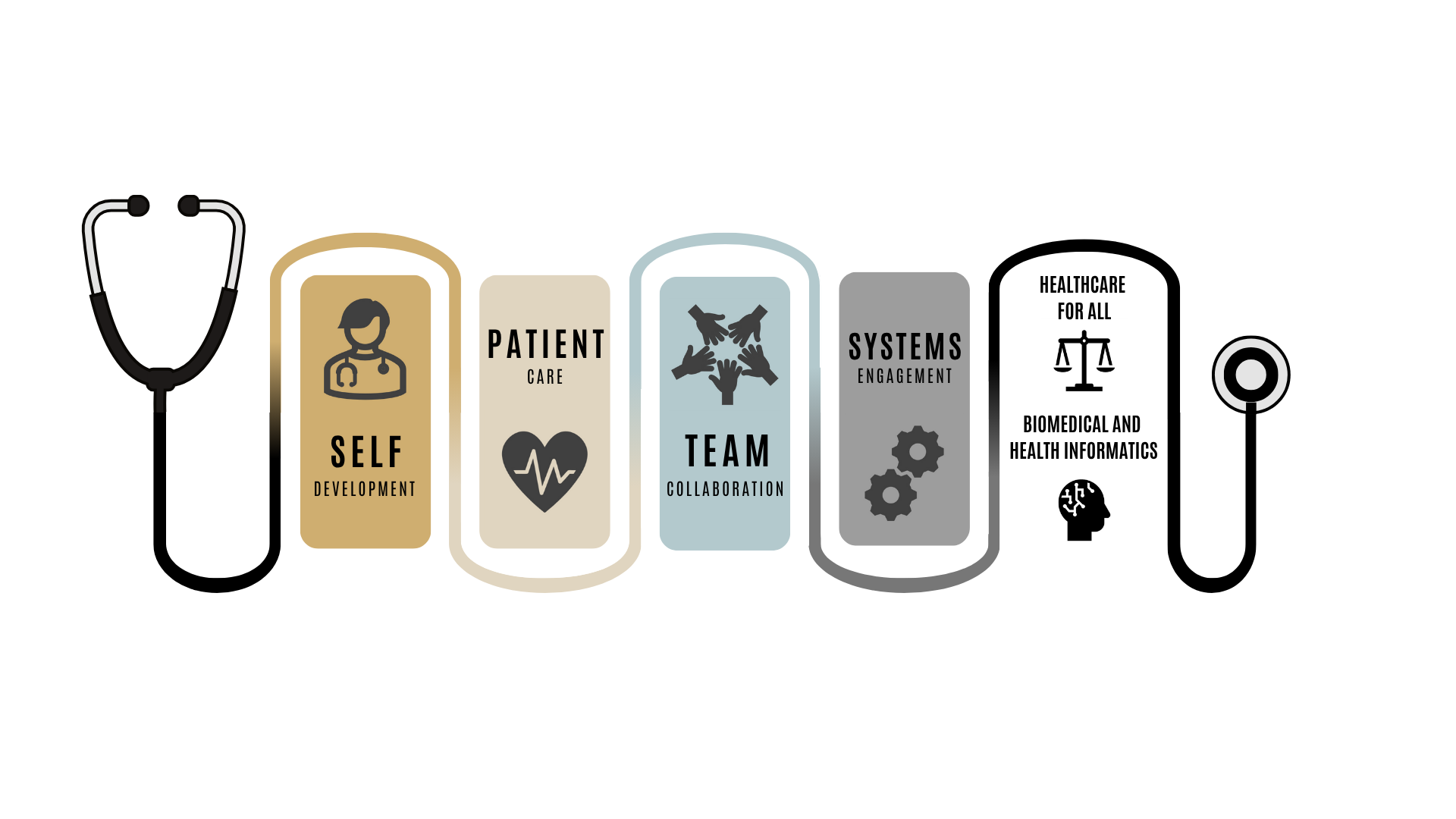
The Four Pillars of FPR
FPR is a “doctoring” course that encompasses four core responsibilities necessary for physicians: responsibility for self-development, responsibility for the care of patients and families, responsibility for team collaboration, and responsibility for engaging in and improving the healthcare system.
These four core responsibilities form the basis of all the teaching and learning experiences within FPR. Additionally, integrated into all components of FPR are core competencies in Health Care for All and Health Informatics.
-
Self
FPR: Self-Development is also known as Learning Communities. Learning Communities provide a nurturing environment for you to develop your unique personal professional identity, helping you build an appropriate image of the medical profession and skill set related to functioning within the healthcare environment.
What is a Learning Community?
Learning Communities are “intentionally developed longitudinal groups that aim to enhance students’ medical school experience and to maximize learning (Shochet et al, 2019).” At Vanderbilt, each Learning Community consists of student peers and College Mentors who engage together in small group learning over the course of your medical school career. The Learning Communities foster communication between faculty and students, encourage active participation in learning activities, and promote the development of a trusting and caring environment. Through facilitated group discussion, peer-teaching, and exposure to content experts, you will foster professional identity formation and personal growth, equipping you to care for patients and team members within the greater healthcare system.
What are the goals of Self/Learning Communities?
The Learning Communities were designed to develop the professional skills and personal attributes necessary to deliver ethical, empathetic, well-reasoned healthcare to the populations we serve. To accomplish this, we focus on the following six goals: lead well, practice morally, appreciate systems, think critically, act responsibly, and know thyself.
How are Learning Communities designed?
Learning Communities follows a flipped-classroom format and utilizes content experts from the variety of fields being covered in the course. The eight current College Mentors facilitate small-group discussion and reflection around the topics addressing personal areas of growth such as metacognition and clinical reasoning, ethics, health care for all, service, and leadership. The academic sessions are developmentally appropriate as you mature through the curriculum and effectively integrated with other courses.
FPR Co-Course Directors, Self
- Shannon Lester, MD, Assistant Professor of Clinical Medicine
- Maya Neeley, MD, Associate Professor of Pediatrics
To learn more about FPR: Self/Learning Communities, please email us at LC@vanderbilt.edu.
-
Patient
FPR: Patient Care is your first introduction to clinical medicine. You gain the knowledge and skills essential for performing a medical history, physical examination, and the foundations of clinical reasoning. Patient Care follows the body systems being taught in the foundational science courses, with expert guest lecturers presenting core concepts.
Simulation
You will have the opportunity to work in small groups to experience hands-on learning. You also will regularly visit the Center for Experiential Learning and Assessment (CELA), working with standardized patients to gain and practice clinical skills and receive guidance and feedback from faculty and patients.
Clinical Skills Teachers
In addition to working in CELA, you work with Clinical Skills Teachers (CST) in the inpatient hospital setting at Vanderbilt University Medical Center and/or the Veteran’s Affairs Hospital. Even in the first few weeks of medical school, you will meet, interview, and examine real patients with assistance and direct supervision from your CST.
FPR Co-Course Directors, Patient
- Rachel Apple, MD, MPH
Associate Professor of Medicine
Director of Clinical Skills Development
Vanderbilt University School of Medicine - Anuj Patel, MD
Assistant Professor of Clinical Pediatrics
Vanderbilt University School of Medicine
To learn more about FPR - Patient, please email us at fprpatient@vanderbilt.edu.
- Rachel Apple, MD, MPH
-
Team
Teamwork and Interprofessional Learning
“Interprofessional education (IPE) occurs when students from two or more professions learn about, from, and with each other to enable effective collaboration and improve health outcomes. Once students understand how to work interprofessionally, they are ready to enter the workplace as a member of the collaborative practice team.”
Source: World Health Organization (WHO). (2010). Framework for action on Interprofessional Education & Collaborative Practice. Geneva: WHO.Why is IPE important?
Traditionally, students in the health professions have been trained in isolation from other healthcare professions—the silo phenomenon. However, patients deserve healthcare teams that work collaboratively and cohesively across professions to address their physical, social, and behavioral health needs. IPE challenges the way we teach and deliver care and encourages us to break out of our silos. IPE is grounded in the principle that when members of the healthcare team come together with a shared vision, mutual respect, and joint accountability, patients will receive care that is safer, more effective, and more patient centered—and will ultimately improve the quality of care and enhance patient outcomes.
IPE at Vanderbilt
Vanderbilt has a rich tradition of interprofessional education. Since 2010, the Vanderbilt Program in Interprofessional Learning (VPIL) allowed a subset of students from medicine, nursing, pharmacy, and social work to work together in clinic-based teams. To allow all medical students to more deeply learn about interprofessional education, we have developed a revised IPE program called the Vanderbilt Interprofessional Health Education Collaborative (VIPHEC), which was inspired by the legacy VPIL program.
In VIPHEC, you will join students from pharmacy, nursing, counseling, marriage and family therapy, and social work programs across Vanderbilt University, Lipscomb University, and the University of Tennessee to participate in a year-long longitudinal curriculum. You will engage in seminars, interactive educational activities, and interprofessional team-based projects with the goal of fostering and promoting the knowledge, skills, and values necessary for comprehensive team-based collaborative practice.
The VIPHEC learning goals and educational activities will explore the competency framework created by the Interprofessional Education Collaborative (IPEC). The Core Competencies for Interprofessional Collaborative Practice include:
- Values and Ethics
- Roles and Responsibilities
- Communication
- Teams and Teamwork

Partner Schools
IPHEC is a partnership between six health science programs across Vanderbilt University, Lipscomb University, and the University of Tennessee.
FPR Course Co-Directors, Team
- Charlotte M. Brown, MD
Associate Professor of Clinical Pediatrics
Vanderbilt University School of Medicine - Abbie Burka, PharmD, BCPS, BCCCP
Associate Professor
Associate Dean of Assessment
Director of Interprofessional Education
Lipscomb University College of Pharmacy
To learn more about VIPHEC or Interprofessional Education at Vanderbilt, contact viphec@vanderbilt.edu.
-
Systems
Modern healthcare has come a long way from a doctor, a patient, and a treatment plan. With the modern specialization and complexity of healthcare delivery, a diverse set of interconnected systems now exist in order to carry out optimal healthcare. Unfortunately, sometimes these complex systems can result in difficulties for patients and providers as they navigate a treatment path.
FPR: Systems Engagement introduces students to the elements of the American Medical Association’s Health Systems Science conceptual model. Health Systems Science recognizes there are a variety of structures that should work together to benefit the patient. Health systems thinking incorporates the design, implementation, improvement, and coordination within and between these systems.
Being trained in this model will help you better meet the needs of a changing 21st century healthcare landscape.
FPR Co-Course Directors, Systems
- John A. Graves, PhD
Professor of Health Policy and Medicine
Professor of Management
Vanderbilt Owen Graduate School of Management
Vanderbilt University School of Medicine - Ryan J. Buckley, MD
Associate Professor of Clinical Medicine
Director, Medical Innovators Development Program
Director, Miller Society
Vanderbilt University School of Medicine - Kurt A. Smith, MD
Associate Professor of Emergency Medicine
Vanderbilt University School of Medicine
For more information about HSS, please email us at fpr@vanderbilt.edu.
- John A. Graves, PhD
-
Health Care for All
The vision of Vanderbilt University School of Medicine is to shape a future in which all persons reach their full health potential. We are committed to educate and train physicians to have the skills, behaviors, and attitudes to promote health care for all in all their endeavors.
Healthcare for All competencies are integrated within all components of FPR—Self, Team, Systems, and Patient Care—as we believe this is essential to all aspects of medicine. We begin with sessions to discuss how language promotes trust, followed by an introduction to community health and social needs that impact human health.
You will attend context talks by community partners and local experts, followed by group or individual activities designed to facilitate the learning of practical actions that promote the opportunity for all persons to reach their full health potential at each level of FPR (Self, Patient, Team, and Systems). Other topics include:
- Personalizing Care
- Advocacy and Policy Change
- Health Literacy, Numberacy, and Language Proficiency (medical interpretation)
- Housing Insecurity
- LGBTQ+ Health
- Rural Health
- The Justice System and Health
- Firearm Safety and Health Outcomes
- Indigenous Health and Indian Health Services
Health Care for All Faculty
- Lourdes Estrada, PhD
Assistant Dean for Community Health Education
Professor Department of Biochemistry
Associate Director, Academic Programs & Operations
Medical Scientist Training Program (MSTP)
Co-Director, MSTP Antiracism, Diversity, and Inclusion (ADI) Council
Vanderbilt University School of Medicine - Jillian Berkman, MD
Assistant Professor in Neurology
Vanderbilt University School of Medicine
For more information on Health Care for All in FPR and VUSM, please email Lourdes.Estrada@vanderbilt.edu.
-
Health Informatics & Artificial Intelligence
The Future of Medicine: Where Data, Technology, and Care Converge
Modern medicine is powered by data and technology, and at the heart of this transformation is Biomedical and Health Informatics. As a physician, you won’t just be delivering care—you’ll also integrate information systems, data-driven insights, and artificial intelligence (AI) to enhance patient outcomes. At Vanderbilt, we prepare you to practice and lead in a system of healthcare where informatics is a fundamental part of the present and future of clinical practice.
What is Informatics?
Informatics is best characterized as the intersection of people, processes or systems and, of course, technology and data science. Biomedical and health informatics specifically is impacted by the science of health and biology as well as organizational behavior, communication, and relationships (Hersh, 2009). In other words, every physician is, in part, an informatician—relying on data and technology to make informed decisions as part of a team or organization within a complex healthcare system.
Why learn about AI in medical school?
AI is transforming every corner of healthcare, making it essential for future physicians to understand and embrace these tools. With the rapid pace of advancements, you will need more than just a passing familiarity with AI—you will need to understand how these tools can augment your expertise, improve efficiency, and uncover new insights from complex data, all while preventing perpetuation of bias. Regardless of your chosen specialty or career path, you will encounter AI-driven solutions—from automating routine administrative tasks to identifying subtle patterns that enhance personalized care. By gaining this knowledge early, you will build a foundation of adaptability, enabling you to embrace future innovations and deliver the highest standard of care in a world where technology and medicine are increasingly entangled.
Informatics/AI Curriculum in FPR
Training in informatics and AI is deeply integrated across your entire medical school experience, anchored in the Foundations of Physician Responsibility (FPR) curriculum and extending throughout your education. You will develop core informatics competency across the levels of Self, Patient, Team, and Systems, gaining hands-on experience that prepares you for the real-world use of BMHI.
During your time at VUSM, you will learn to…
- Practice in Harmony with Health IT – Health Information Technology (Health IT) is the backbone of modern clinical practice. From EHRs to patient portals, these systems streamline care but can also contribute to physician administrative burden and burnout. In this curriculum, you’ll learn to navigate Health IT with skill—using technology to improve patient care, collaborate with teams, and engage with healthcare systems, all while maintaining a balanced, adaptable relationship with the tools you use.
- Engage with the Learning Health System – Healthcare is increasingly driven by vast amounts of real-world data. Data from EHRs, remote patient monitoring, imaging systems, genomic analysis, and more, power the learning health system—a continuous, data-driven loop where patient care is constantly improved through evidence generation. At Vanderbilt, you’ll learn to engage with this system, leveraging data to personalize care, fill gaps in medical evidence, and contribute to system-level improvements.
- Collaborate with AI – Artificial intelligence (AI) is transforming the future of medicine, offering new ways to enhance learning, improve decision-making and streamline workflows. In this curriculum, you’ll learn about the diverse opportunities for AI in healthcare (examples below) and how to integrate it thoughtfully into your practice—not to replace human judgment, but to amplify it. You’ll explore how collaborating with AI can lead to better patient care, reinforcing the idea that the most powerful medicine combines the strengths of both human and machine.
Beyond FPR – Unparalleled BMHI Expertise
Want to take your BMHI training further? Outside of FPR, you’ll have opportunities to dive deeper into clinical informatics, whether through immersive electives or cutting-edge research with the VUMC Department of Biomedical Informatics, the largest BMHI department in the world. Whether you aspire to specialize in clinical informatics or advance the science of BMHI through data and AI, Vanderbilt offers you the tools and mentorship to explore these fields in depth.
Biomedical Informatics Faculty
- Julian Genkins, MD
Assistant Professor of Medicine
Assistant Professor of Biomedical Informatics
For more information on Biomedical and Health Informatics in FPR and at VUSM, please email fpr@vanderbilt.edu.
FPR by Year
-
Year 1
How is FPR:Patient Taught in Year 1? – Clinical Home Experience (Patient)
As a first-year student, you will be assigned to an ambulatory clinical home. In this longitudinal outpatient clinical preceptorship, you will start by shadowing your preceptor, but quickly transition to taking patient histories, performing physical exams, and presenting your findings to your clinic home preceptor. You will also be able to participate in discussions with providers, deciding diagnoses and next steps.
How is Health Systems Science Taught in Year 1?
FPR: Systems Engagement begins with Health Systems Science (HSS), where you will explore the healthcare system, understanding its shortcomings and highlighting its successes. The FPR: Systems Engagement curriculum guides you through some of the complex systems that make up healthcare, such as insurance programs and health care policy, under the guidance of professionals in those fields.
The course starts by examining the macrosystems (private insurance systems, Medicaid and Medicare, health policy) of health care. You will also consider the experience of individual patients in Case-Based Learning seminars to see how smaller systems of care (public transportation, transitions of care, cultural networks, local healthcare policy, hospital networks) affect the ability of providers to give care, as well as modify how patients navigate their illnesses and routine care. Throughout each session you will develop “systems thinking skills,” enabling you to understand and analyze systems. The first-year curriculum prepares you for success in clerkships and is foundational for projects such as quality improvement initiatives in subsequent years.
As you move through your clinical years, you will continue to examine how these systems can be leveraged to improve patient care, including how quality and safety are measured and improved in healthcare settings.
-
Year 2
The Foundations of Physician Responsibility 2 (FPR2) builds on concepts introduced by FPR1 as the next installment of VUSMs longitudinal integrated "doctoring" program. This course carries forward the core responsibilities—Patient Care, Self Development, Team Collaboration, Systems Engagement as well as the threads of Healthcare for All, and Biomedical & Health Informatics—into the Foundations of Clinical Care (FCC) phase. Through a combination of interactive small group learning, didactic sessions, CELA simulations, and in-depth discussion with your College Mentor, FPR 2 helps students relate their clinical clerkship experiences to these key concepts.
During each of your 8-week clinical clerkships, your entire class will come together on the 2nd and 6th Monday for what VUSM calls our "FCC Longitudinal Days." You will have some preparatory work such as readings, videos, reflections, designed to prime you for the morning's activities. In a small group, you will read about a hypothetical patient with complex challenges that transcend clinical specialties. They may be transitioning between insurance providers or experiencing housing insecurity. Perhaps a medical error has occurred.
- You will spend 90 minutes in facilitated small group activities struggling with how to navigate these challenges.
- Then your small groups will come back together as a large group for a 60-minute context talk from a subject matter expert or a panel of individuals to provide a broad perspective.
- Lastly, you will convene within your Colleges for a 90-minute in-depth debrief and reflection session.
This process — wrestling with a difficult concept, seeking broad perspective & expertise, then reflecting and debriefing on the experience — is something physicians do every day in the clinical environment. It is our hope that you learn this habit of life-long learning, as much as the content within each session.
-
Years 3 & 4
After countless conversations and gatherings, your Learning Community cohort grows closer than ever during Immersion.
The hours you’ve spent together over the past few years continue to bear fruit through conversations about health care leadership, personal growth, and medical ethics. Together, you’ll talk through tricky ethical situations that might come up in clinic and take time for self-reflection as this phase of your medical education comes to a close.
FPR Program Leadership
-
Ryan Buckley, MD
Associate Professor of Clinical Medicine
-
Heather A. Ridinger, MD, MHPE
Associate Professor of Medicine

